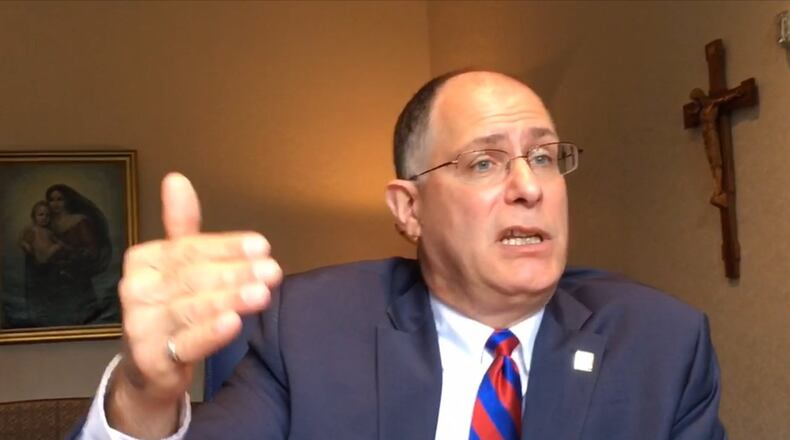“It’s no fault of theirs,” said Tony Ortiz, associate vice president for Latino Affairs at Wright State. “Some of them didn’t even know they were undocumented until they got older.”
Other Ohio college presidents to sign the letter included Ohio State's Michael Drake and the Rev. Michael Graham of Xavier. The letter, which was started at Pomona College in California, was spurred by President-elect Donald Trump's tough campaign talk on immigration.
“We’re concerned for their well-being,” UD vice president for diversity and inclusion Lawrence Burnley said of the letter. “There is a lot of unease and concern.”
UD is home to some undocument students who Burnley said are hesitant to speak out. UD has “a rich tradition of being a sanctuary” for people, he said, because of the Catholic Church and the school’s Marianist roots.
He said he was happy to see Spina add his name to the letter and another one that consisted of signatures from the country’s Catholic colleges. Graham also signed the letter from Catholic college leaders.
“It sends a message of our caring and solidarity,” Burnley said. “We’re telling them we care about you.”
At Xavier, Graham wrote a letter to faculty, staff and students expressing support for the protection of undocumented students. Graham wrote that efforts to protect students “start in our hometown of Cincinnati.”
“Xavier will continue to lean in and actively support the well-being and participation of the immigrant, refugee and international populations in our local and regional community,” Graham wrote.
As of Tuesday, Wright State President David Hopkins had not signed the letter. But Ortiz said the campus may try to protect its undocumented students by making Wright State a “sanctuary school.”
A sanctuary campus or school is something like a sanctuary city, Ortiz said. As a sanctuary campus, a college would “limit cooperation with immigration authorities’ deportation efforts,” according to The Chronicle of Higher Education.
Discussions about making Wright State a sanctuary campus are just beginning and have been student driven, Ortiz said. The university is considering the measure to reassure both undocumented and international students, he said.
“They’re all running scared, Ortiz said. “They don’t know what’s going to happen.”
If the idea gains momentum, Wright State will be following a pattern that has developed on college campuses. Students at Ohio State and the University of Cincinnati circulated petitions advocating that their campuses become sanctuaries.
Despite Spina’s support of DACA, Burnley said he does not think UD is considering becoming a sanctuary school.
“It doesn’t go that far at all,” Burnley said. “We make decisions on a case by case basis.”
Undocumented students typically “try to live under the radar,” Ortiz said, but the push to protect them has grown.
It shows that people want “humane” immigration reform, Ortiz said, and it shows how significant undocumented immigrants are to the country. Ohio is home to an estimated 98,000 undocumented immigrants who pay about $67 million in state taxes, according to The Partnership for a New American Economy, a nonpartisan organization advocating for immigration reform.
“Some of these kids are the brightest kids around,” Ortiz said. “They contribute to the economic balance of Ohio.”
Undocumented immigrants in Ohio
97,916 undocumented immigrants
$67.6 million paid in state taxes
$129.9 million paid in federal taxes
Source: The Partnership for a New American Economy
About the Author
